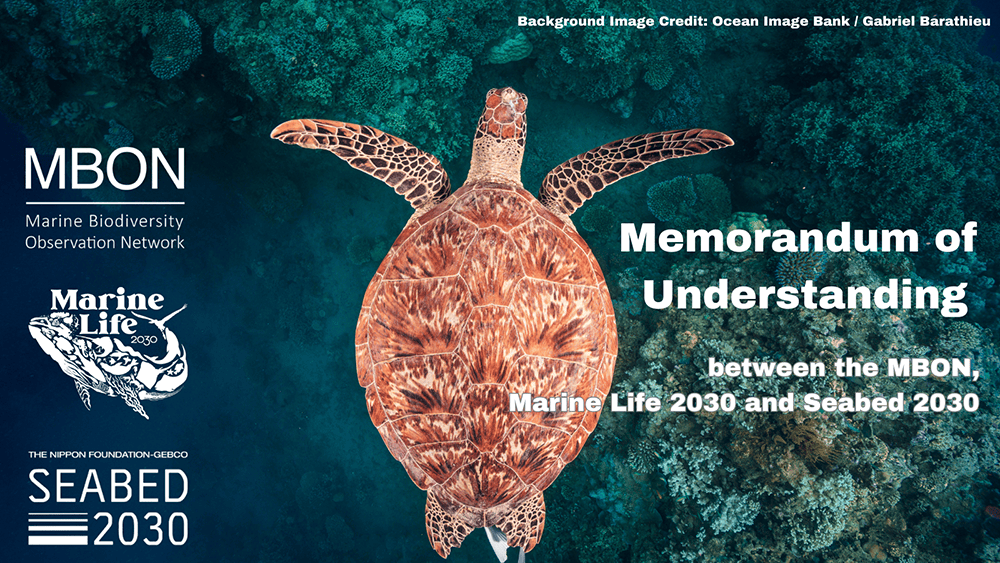The MBON announces new partnership with Seabed2030 and Marine Life 2030 to share the capacity to map the seabed and observe marine life
 A new partnership has been announced between the Marine Biodiversity Observation Network (MBON), Marine Life 2030 and the Nippon Foundation-GEBCO Seabed 2030 Project. The memorandum of understanding signed by the parties outlines their commitment to advancing the field of ocean exploration, with a particular focus on the observation of marine life.
A new partnership has been announced between the Marine Biodiversity Observation Network (MBON), Marine Life 2030 and the Nippon Foundation-GEBCO Seabed 2030 Project. The memorandum of understanding signed by the parties outlines their commitment to advancing the field of ocean exploration, with a particular focus on the observation of marine life.
The MBON and two programmes endorsed by the UN Decade of Ocean Science for Sustainable Development: Marine Life 2030 and Seabed 2030, (sponsored by the Nippon Foundation-GEBCO) recognize the need for globally coordinated and sustained ocean mapping and biodiversity observing. Such integrated mapping is needed to systematically assess the state of the ocean, including marine life and ecosystems, and to detect change as the ocean changes. This knowledge will provide the basis to more effectively conserve and sustainably use marine life both within and beyond areas of national jurisdiction.
The agreement signed between MBON, Marine Life 2030, and Seabed 2030 recognizes the need for cooperation to map both the bathymetry and biodiversity of the global ocean, collaborating with different stakeholders, building their capacity and providing them with the best available resources and expertise. Through collaboration, these international networks, will advance understanding and contribute to the UN Decade of Ocean Science for Sustainable Development.
“It’s a pleasure to welcome MBON and Marine Life 2030 to Seabed 2030’s valued network of partners,” commented Seabed 2030 Project Director Jamie McMichael-Phillips. “The essential work of these organisations helps empower the world to make informed policy decisions on marine biodiversity and ocean sustainability.”
“MBON and Marine Life 2030 are excited to collaborate with Seabed 2030. We need such global networks to bring different people together to work on difficult questions like where marine life exists and how and why it is changing. The knowledge will help manage when, where, and how we can use ocean resources in a way that conserves the amazing diversity of marine life, for the joy and benefit of our own and future generations”, says Frank Muller-Karger, MBON co-chair and Marine Life 2030 co-lead.
For more information on The Nippon Foundation-GEBCO Seabed 2030 Project, please visit our website, seabed2030.org, like our Facebook page, follow us on Twitter @Seabed2030, or contact enquiries@seabed2030.org.
For media inquiries, contact:
Pegah Souri
pegah.souri@shearwater.global
+44 (0)7951 581707
For more information about the MBON, please visit our website, marinebon.org, follow us on Twitter @MarineBON1 or contact joana.soares@gmail.com. For more information about Marine Life 2030, please visit our website, marinelife2030.org, follow us on Twitter, LinkedIn and Instagram, or contact marinelife2030@gmail.com.
The Nippon Foundation-GEBCO Seabed 2030 Project is a collaborative project between The Nippon Foundation and GEBCO. The Seabed 2030 Project, launched at the United Nations Ocean Conference in 2017 by Chairman Sasakawa of The Nippon Foundation, coordinates and oversees the sourcing and compilation of bathymetric data from different parts of the world’s ocean through its five centres into the freely-available GEBCO Grid. Four Regional Centres cover the Southern Ocean, the Arctic and North Pacific Ocean, the Atlantic and Indian Oceans, and the South and West Pacific Ocean. These feed data products into the Global Data Centre. The IHO Data Center for Digital Bathymetry (DCDB) serves as the long-term archive for Seabed 2030.
The Marine Biodiversity Observation Network (MBON) is a thematic node of the Group on Earth Observations Biodiversity Observation Network (GEO BON). It facilitates networking amongst the marine biodiversity community to improve standards and best practices in the collection, management, and open publication of marine biodiversity data. The MBON coordinates the community of practice for the Marine Life 2030 Programme endorsed by the Ocean Decade. Marine Life 2030 helps to network different partners to achieve the goals of the UN Ocean Decade, especially those relevant to marine life and life in general.

